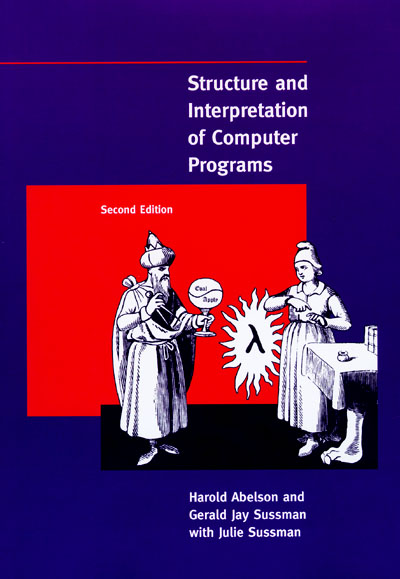TITLE: What Penn and Teller Have in Common With a Compilers Course
AUTHOR: Eugene Wallingford
DATE: April 11, 2012 4:06 PM
DESC:
-----
BODY:
Early this morning (and I mean early!), Alfred Thompson
posted
What Do Magic and Computer Science Have in Common?,
relaying that Alex Suter of Industrial Light & Magic
will give the closing keynote at this summer's Computer
Science and Information Technology conference. That sounds
pretty cool. The title of his entry conjured up other
thoughts for me, though, especially in light of something I
said in class yesterday.
Recently, I used a superhero reference in
a blog entry.
That is how many people feel when they use a program to
accomplish something meaningful --
like a superhero.
I feel that way, too, sometimes. However, like many other
people, I am more prone to magical imagery. To someone who
has not learned to code, a program is like an incantation,
capable of making the computer do something mystical.
There is a long tradition of magical imagery in computer
science. The Hacker's Dictionary tells us that a
wizard
is someone who knows how a complex piece of software
or hardware works (that is, who
groks
it). A wizard can do things that hackers and mere
mortals cannot. The entry for "wizard" has links to
other magical jargon, such as
heavy wizardry
incantation>/A>
and
magic
itself.
I tell my Programming Languages students that this is a
course in which the "high priests" of computer science
reveal their secrets, that after the course students will
understand the magic embodied in the interpreters and
compilers that process their programs. I should probably
refer to wizards, rather high priests, given that so many
of the course's ideas are covered masterfully in
SICP.
Lots of CS courses reveal magic, or propose it. A course
in compliers finishes the job of Programming Languages,
driving program translation all the way down to hardware.
Artificial Intelligence describes our best ideas for how
to make a computer do human-like magic: reasoning,
recognizing patterns, learning, and
playing Jeopardy!.
In my compliers class yesterday, I was showing my students
a technique for generating
three-address code
from an abstract syntax tree, based in large part on ideas
found in
the Dragon book
(surely not a coincidence). I wrote on the board this
template for a grammar rule denoting addition:
E → E1 + E2
E.place := makeNewTemporaryIdentifier()
E.code := [ E1.code ]
[ E2.code ]
emitCode( E.place " := " E1.place " + " E2.place )
When I finished, I stepped back, looked it over, and
realized again just how un-magical that seems.
Indeed, when in written in black on white, it looks
pretty pedestrian.
That made me think of another connection between magic
and computer science, one that applies to practitioners
and outsiders alike. Taking an AI course or a
compilers course is like having Penn and Teller explain
to you how they made a person disappear or a ball
levitate in thin air. For some people, that kills any
joy that might have in watching the act. They don't
want to know. They want to be amazed. And,
knowing that something is implemented -- often in a way
that doesn't seem especially artful, performed with an
obvious misdirection -- prevents them from being amazed.
That can happen in CS, too. My friends and I came in
to our AI course wide-eyed and wanting to be amazed --
and to build amazing things. We studied search and
logical resolution, Bayes' Theorem and decision tree
induction. And it all looked so... pedestrian. Many
of my friends lost their sense of wonder then and there.
Without the magic of AI, they were just as interested in
operating systems or databases. More interested, really,
because AI had let them down. It all looked like parlor
tricks.
But there is a second kind of person in the world. Lots
of people love to watch Penn and Teller explain a trick.
They want to know how it works. They want to
watch again, knowing how it works, to see if they can
notice the deception. If they don't, they are amazed
again. If they do, though, they still feel wonder -- at
the skill of the magicians, at the design of the illusion,
and even at the way their mind wants to trick them at the
moment of execution.
I am of this second kind, for magic and especially for
computer science. Yes, I know that compilers and AI
programs are, at their cores, implemented using
techniques that don't always look all that impressive
in the light of day. Sometimes, those techniques look
pretty boring indeed.
Yet I am still amazed when a C compiler takes in my humble
instructions and creates machine code that compresses a
musical file or fills out my tax return. I am amazed when
Watson crunches through gazillions of bytes of data in a
second or two and beats two most worthy human opponents to
the buzzer. I like to hear my friends and colleagues
de-mystify their current projects with nitty-gritty details.
I still feel wonder -- at their skill, at the cleverness of
their designs, and even at the moment the program runs and
makes something out of what seems like nothing.
That's one thing magic and computer science have in common.
~~~~
IMAGE 1: a photo of the cover of Structure and Interpretation
of Computer Programs. Source:
the book's website.
IMAGE 2: a publicity still of magicians Penn and Teller.
Source:
All-About-Magicians.com.
-----


